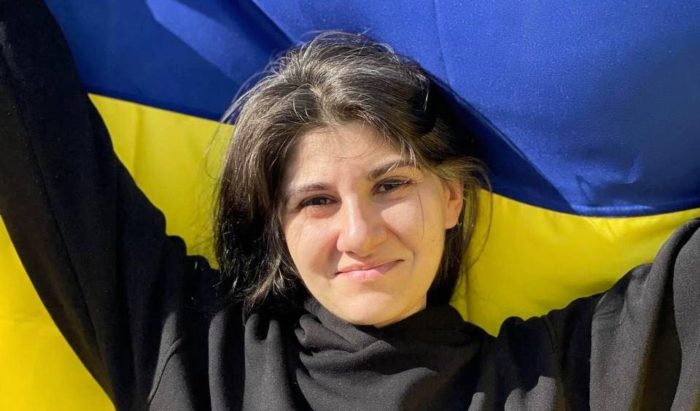When Russian troops invaded Mariupol, Yuliya Matveieva, a judge from the Illichivsk District Court of Mariupol, was ordered to work as a judge for the so-called "Supreme Court of the DNR." She refused, was put on trial and endured seven months of Russian captivity after being detained at a checkpoint near Manhush, Donetsk Oblast. Matveieva suffered electric shocks, faced a firing squad, and endured various forms of abuse and humiliation during her imprisonment, which lasted from March to October 2022.
“While I was there, I heard loud, agonizing screams constantly ... I still can’t believe that men can scream in such pain. Those were truly inhuman sounds ... I don’t know what they were doing to them. At that moment, I wished for God to make me deaf ...”
After her release, she received the Order for Courage, III Class, from President Volodymyr Zelenskyy, but during the presentation, stated that she did not undertake her actions for rewards or privileges. She praised the courage of the military personnel defending Ukraine, especially highlighting the contribution of women.
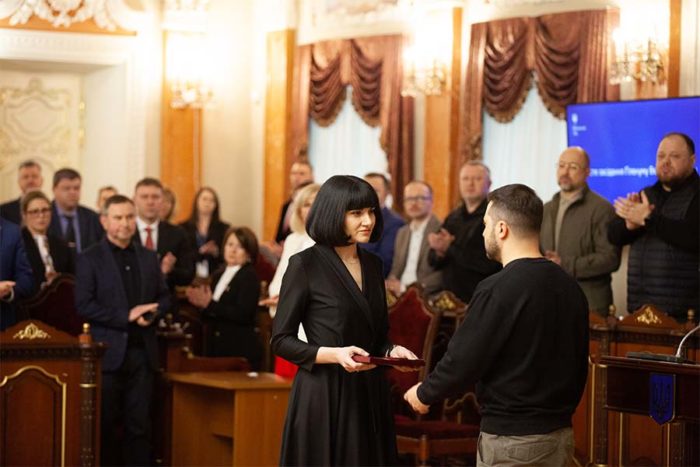
Her husband, Artem Matveiev, also was imprisoned by the Russians for a year. Prior to his captivity, he worked in the prosecutor’s office. From 2018 to 2020, he served as the director of the territorial department of the State Bureau of Investigation in Donetsk and Luhansk Oblasts, investigating criminal offenses against illegal armed groups of the so-called “LNR/DNR” and dispatching criminal indictment files to the court.
February 24, 2022 and escape from Mariupol
Yuliya’s account begins on 24 February 2022 when she decided to go to work at the Mariupol court despite the escalating shelling and constant air raid sirens. No one believed that that the situation could get worse, but it was not long before the shops and pharmacies closed their doors and public transport was suspended.
“It was hell.” Civilians evacuated from Mariupol tell of survival, Russian filtration camps, and death
Yuliya, her husband, mother and 13-year-old daughter endured missile strikes, power outages, food shortages, and lack of water and gas.
“The worst thing happened at night - air strikes and incessant shelling … There were powerful explosions. We had no electricity, no water, and no gas. Along with our neighbors, we resorted to cooking on the street, while my husband went to the spring to collect water,” Yuliya explains.
On March 19, 2022, they left their home in Mariupol. Along the way, they witnessed the destruction and lifeless bodies scattered throughout the town. At the checkpoint in Manhush, their documents were taken, and they were detained for investigation. Her mother and 13-year-old daughter were left alone and stranded on the road.
“They stopped us and requested our documents. They took mine and my husband’s passports and went somewhere. Upon their return, they inquired about my surname. Even then, I should have recognized that something was amiss... They returned my daughter’s birth certificate and my mother’s passport. Then, my husband and I were informed that we needed to proceed to the Manhush police station for filtration to determine ‘if there was any blood on our hands.’”
Yuliya later discovered that an acquaintance stationed at the checkpoint had informed the authorities about their presence. They were placed in pre-trial detention cells; her husband was confined in the “cage” and she was thrown into a small room with 32 people. They were forced to stand all night, and Yuliya witnessed her husband being interrogated at gunpoint.
“In that room, I met Inna Semehen, a servicewoman on maternity leave, who had three children. The youngest child was just one and a half months old at that time. Inna remains in captivity.”
Around two in the morning, an intoxicated young man forcefully entered the room. He carried an assault rifle and seemed to be under the influence of drugs or alcohol. Another individual accompanied him. They escorted Yuliya to the police station, pressed her against the wall, and brandished the assault rifle while interrogating about the number of Russian-backed militants she had convicted. She did not respond... This ordeal continued for some time. In the morning, all the prisoners had their hands bound with duct tape and were boarded onto a bus.
“No one informed us of our destination or the reasons. On the floor of the bus lay a man who was bound and wrapped in a Ukrainian flag. I thought he was dead, but that wasn’t the case. We embarked on a long journey and arrived at the city police station in Dokuchaevsk, Donetsk Oblast. We were lined up against a wall with five machine gunners positioned behind us. To be honest, I thought it was the end. The atmosphere was tense, and silence enveloped us. However, they didn’t open fire.”
They were later transported to Donetsk, where Yuliya was taken to the Department for Combating Organized Crime for interrogation. She and her husband were subsequently held in a temporary detention center for 30 days. Yuliya remained chained to a radiator while her husband was placed in a basement cell.
“In the same room, there was a young man who was systematically beaten by eight individuals. Blood was splattered everywhere. He remained silent throughout the ordeal. According to their version, he had served in the Azov Regiment and participated in shelling Donetsk. All the “DNR” members there were intoxicated, and to be honest, I can’t recall ever seeing any of them sober. The beatings persisted until about 3am and then they took him away. I don’t know whether he’s still alive.”
A land of chaos and anarchy
The following day, armed men transported Yuliya to a temporary detention center where she was placed in a cell alongside two other girls. One of them had been severely beaten. The conditions in the cell were terrible, with overcrowding, lack of hygiene products, and no hot water or tea. Towards the end of March, Yuliya Payevska, the legendary “Tyra”, was transferred to the same cell.
“I spent almost three weeks with her, until April 15... I saw the abuse and brutality she endured... I did my best to assist her, feeding her as she was unable to move her arm. It was truly horrifying…how could they brutalize a woman like that?”
Ukrainian Women at War
After a month or so, Yuliya was taken out of her cell and informed that the investigation would continue for another month. She was later charged with terrorism and taken to the so-called “Investigative Committee of the General Prosecutor's Office of the DNR” for a conversation. They offered her freedom, the opportunity to reunite with her family, and a comfortable life if she agreed to work as a judge for the “Donetsk People’s Republic,” but she refused.
“Fine, I was prepared to endure imprisonment. Collaborating with them would lead me nowhere. If I switched sides, my child would be labeled as the child of a traitor. If they killed me, she’d be the child of a heroine.”
Yuliya was returned to the temporary detention center and informed that on May 23, she would be transferred to a pre-trial detention center.
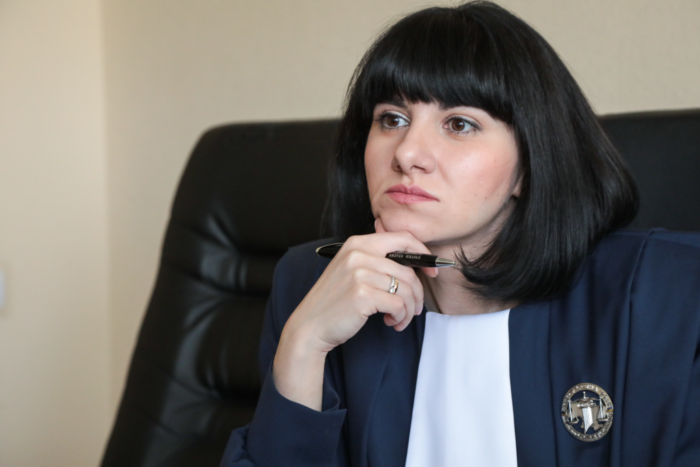
Terror and fear
Yuliya Matveieva, along with three other men, was brought to the pre-trial detention center. They were lined up against a wall and forbidden to look around. Suddenly, a robust man seized her by the shoulders and forcefully dragged her into the building. There, they conducted a cursory search before confining her to a tiny, cramped cell they referred to as a “stakan” (glass container). It was very small, and she was not allowed to sit or even bend down.
“The door swung open, and they forcefully pulled me out of the cell, making me face the wall while placing a bag over my head. It was a bag made of ropes, similar to those children take to school for their shoes. The tighter the ropes, the better... They tugged at those ropes, leading me somewhere. Of course, I couldn’t see anything... They dragged me into a room where they did a fluoroscopy. They took me back in the same way, with the bag and ropes...
While I was there, I heard loud, agonizing screams constantly... I still can’t believe that men can scream in such pain. Those were truly inhuman sounds... I don’t know what they were doing to them. At that moment, I wished for God to make me deaf...”
The treatment she received worsened when the captors discovered she used to be a judge. Whenever she stumbled and fell, they would step on her and wipe their feet on her back. “It was some kind of deep-seated hatred...” she says. The detainees were served poor-quality food, including porridge cooked with “stinking lard” and chicken with feathers still attached.
“We ate it. What else could we do? Porridge, fat... When I was released and saw a video where a Russian prisoner of war complained about not receiving enough salad... well, at least they were given salad. We had nothing. We weren’t even allowed to sit during meals. They monitored us through a peephole. If anyone dared to sit or attempted to take a short break, like bending down to tie a shoelace or anything of the sort, they would either beat us or make us do 70 sit-ups or push-ups.”
Despite the physical and psychological abuse, Yuliya continued to resist her captors.
Torture and electric shocks
On June 3, Yuliya Matveieva was once again escorted to the investigator’s office for interrogation. They no longer made any offers but instead attempted to extract the passwords for her laptop and phone, which had been confiscated during the arrest.
“This equipment was essential to my work. I knew that if they gained access to it, I wouldn’t survive. My objective was to do everything in my power to prevent them from accessing the devices. When they asked for the password, I deliberately provided the wrong one. They asked again, and I again gave them the wrong response. I knew that after several incorrect attempts, the device would be locked.”
At one point, they placed a bag over her head, escorted her outside, and threw her in a car.
“I was sure they’d take me to a field and execute me. Whatever happens, let it be, I thought. I wanted the suffering to come to an end...”
She was threatened with execution several times and taken to a psychiatric hospital for examination. Yuliya experienced electric shocks during interrogations but never revealed the passwords they wanted.
Trending Now
“Then, they took a different approach. You know, I’ve never told anybody about the electric shocks… It’s too horrible. I vividly remember the sensation of the electric current passing through my body... I lost consciousness... But I never revealed the passwords.”
Stories too horrifying to disclose. Over 80 Ukrainian medics tortured in Russian captivity
“Each day felt like my last”
On July 6, Yuliya and the other women accused of terrorism were moved to a basement cell known as the “special purpose post”. The conditions there were even worse, with extreme heat, infestations of rats and ticks, and lack of water. The overcrowded cell housed 17 people, and the lack of sanitation and hygiene products was appalling. Yuliya and others suffered from ticks, and she required surgery for the boils after her release.
The prisoners pleaded for water, but instead of receiving it, they were given pickles and told to drink the brine. A girl from Azov, who had been severely beaten, arrived in their cell.
“On August 19, a girl from Azov was thrown into our cell. She was eventually released during one of the prisoner swaps. She’d been severely beaten - her lower back was entirely black and blue, and her skin was cracked... Every day, as you sit there, you wonder if you’ll make it to the next morning. Each day felt like my last.”
Sentenced to death
On August 29, Yuliya was summoned before the investigator and charged with attempting to undermine the constitutional order of the “DNR” through her work and the approval of judicial decisions. The potential punishment ranged from 12 to 20 years in prison or the death penalty by firing squad. The authorities claimed to have discovered four of her rulings at the regional prosecutor’s office in Mariupol as evidence.
Yuliya explains that these decisions were collective and pertained to a special investigation conducted in absentia against specific defendants. One of the suspects was a deputy prosecutor named Fedotova, whose husband worked for the “DNR’s investigative committee” and had a particular interest in Yuliya. Yuliya pointed out that she had sat on the panel of judges that rejected the launch of the investigation, and that Fedotova had been placed on the wanted list.
Yuliya was accused of conspiring with Ukraine’s SBU, an organization recognized as terrorist by the “DNR”, in making these decisions. She criticized the competence of those accusing her, highlighting their lack of understanding of the law.
Although Yuliya had a lawyer with her, his presence was a mere formality. The lawyer provided her with a phone number, allowing Yuliya to communicate with her family twice to learn about their whereabouts and share some information about herself.
In fact, after Yuliya and her husband’s detention, her mother and daughter had sought refuge with kind-hearted individuals in Manhush for two nights before journeying to Berdiansk. At a checkpoint, they were detained by Russian military personnel for five hours, and her daughter was separated from her grandmother. Eventually, they reached Dnipro and stayed in a sanatorium, thanks to one of Yuliya’s colleagues. Later, another colleague from Lutsk offered them a place to stay until Yuliya’s return.
The first court hearing for Yuliya’s case was scheduled for September 27, but it was canceled due to the illegal referendum regarding the “DNR’s accession to Russia”.

“Your husband is in cell 105”
The conditions in the prison cell were harsh; it was extremely cold, there was no access to medicine or news, clothing and food were scarce.
“Perhaps the most distressing aspect was the absolute lack of information. I was aware that things were happening, that our government would attempt to negotiate an exchange. Meanwhile, we were told that Ukraine no longer existed, that the western regions had become part of Hungary and Poland, and that Odesa, Mykolaiv, Kherson, Kharkiv, Dnipro, Mariupol and Zaporizhzhia were already under Russian control. They told us that the Ukrainian side executed everyone who returned. Well, that’s all nonsense... Being imprisoned for an extended period, cut off from the outside world, you start losing faith in the possibility of being released. Different thoughts cross your mind during such times, and sometimes you want to end it all.”
On one occasion, Yuliya and other women were taken away with bags over their heads and then brought back to their cells without any explanation. The uncertainty and fear were overwhelming.
Finally, the women were taken to a large room where they were handed release certificates. The next day, they were moved again, this time blindfolded and with their hands tied. They were taken on a long journey, and Yuliya thought they were going to die, but then she realized they had come full circle - when she smelled the familiar odor of the detention center she knew they were back at the prison.
“Then we heard someone shout through the wall: ‘Is Yuliya Matveieva there? Your husband is in cell 105’. I pressed myself hard against the bars and yelled: ‘Artem, I love you!’. And, like in a movie, they relayed it from cell to cell: ‘She loves him!’. And at the end they added: ‘Over’. That was our prison romance,” Yuliya says with a smile.
Home at last!
On October 17, 2022, the women prisoners were loaded onto Kamaz trucks, which took them to a location somewhere near Taganrog, Rostov Oblast.
“They drove for a long time, and at 3 am we reached Taganrog. Chechens were driving us. They said that at 6 am we would be flown somewhere, maybe somewhere in Russia, they said, because the detention center was overcrowded. It had a capacity of 3,500 people, but there were about 7,000 there now. But we’d signed release certificates, so I doubted that their version was true.”
The women then boarded a cargo plane, seated one behind the other with their arms on each other’s shoulders and legs spread apart. They landed in Dzhankoi, Crimea, and were taken to Vasylivka in Zaporizhzhia Oblast before reaching the exchange point.
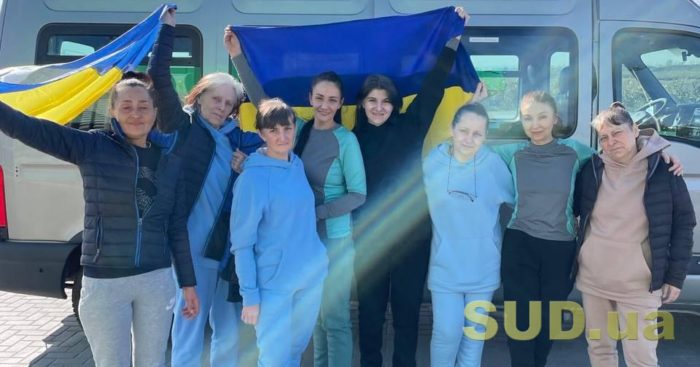
Yuliya and the other prisoners couldn’t believe their eyes when they realized they had been released, feeling like it was a dream. In total, 108 Ukrainian women were released that day. Afterward, they were transported to a hospital where they finally enjoyed a good meal and experienced the joy of freedom.
“After our release, I had such an adrenaline rush that I couldn’t sleep or eat for three nights. We gazed at the stars all night. It was unbelievable to have the freedom to sit, lie down, and move around as we pleased. We were provided with all essential amenities like a shower, a mirror, and even face masks. We had everything we needed: clothes, supplies, and hygiene products. I must emphasize that the exchange and meeting were impeccably organized.”
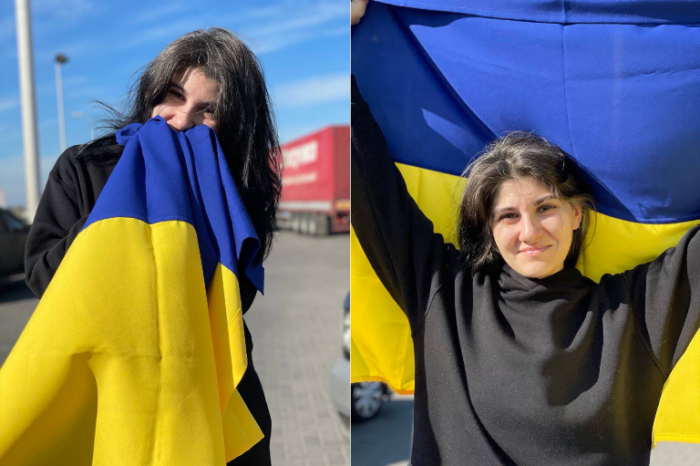
Yuliya still has trouble sleeping and struggles to adjust to being around many people. She is thankful to those who helped secure her release and acknowledges the support she received during such a challenging time. However, she lost everything and was pained to see the destruction in Mariupol. Despite the difficulties, having her family with her became the most important thing. In January 2023, she began working at the Shevchenkivskyi Court in Kyiv, where she received a warm welcome.

Whenever missiles and shells fall on Kyiv, Yuliya and her family think of Mariupol. Her mother cries and her daughter has trouble sleeping and clings to her mother. However, Yuliya feels safer in Kyiv and expresses gratitude to the Ukrainian Armed Forces and the air defense systems provided by western partners.
Artem, Yuliya’s husband was released on February 20, 2023. He described the harsh conditions in prison, where violence and abuse were prevalent, both psychological and physical. The food was terrible and scarce, leading him to lose 50 kilograms. It was very difficult for the prisoners. They were crammed into overcrowded cells and had to sleep on the floor or bare bunks. Artem notes that most of them were Azov fighters, both in the Taganrog and Donetsk prisons.

Artem’s release was marked by administrative detentions, false accusations, and court orders. He notes the deep hatred of Ukrainians among Taganrog residents and the role of Russian propaganda in fueling animosity.
“The ‘DNR’ despises Ukrainians to the core. It’s hard to understand the reasons behind this hatred. Propaganda plays a significant role; I really don’t know what they’re being told, probably how Ukrainians continue shelling and killing... They attribute all their problems to us, blame the Ukrainians for everything. It’s all ‘because of you, because of me as a Ukrainian, because of the state of Ukraine as a whole’”.
After his release, Artem embarked on a journey that took him through Rostov, Moscow, Pskov, Riga, Warsaw, and finally Kyiv. The entire trip took three days. On March 23, 2023, he stood on the doorstep of the family apartment.
“I experienced a profound sense of freedom when I crossed the border and left the Russian Federation. At the Estonian border, I distinctly remember meeting a border guard. He asked for my name, and I hurriedly replied, ‘Artem Matveiev, born on January 23, 1975’. He smiled and replied in Estonian, ‘Don’t speak so quickly. You’re no longer in prison’. That was the moment I truly felt liberated. My family was waiting, and everyone welcomed me with open arms, hugging and kissing...”
It is impossible to give an exact figure for the number of Ukrainian civilians and servicemen in Russian captivity. Ukrainian authorities state that thousands, including women and children are being held in the Russian Federation. Some were imprisoned in the Donbas and Crimea well before the full-scale invasion of February 2022.
As of December 30, 2022, about 15,000 Ukrainian civilians and 7,000 servicemen are reported missing.

